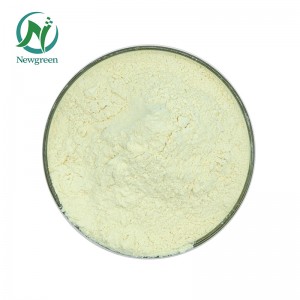Newgreen Manufacturer Directly Supply D Aspartic Acid Price L-Aspartic Acid Powder

Product Description
Introduction to L-Aspartic Acid
L-Aspartic Acid (L-Aspartic Acid) is a non-essential amino acid, belonging to a group of alpha-amino acids. It can be synthesized from other amino acids in the body, so it does not need to be obtained through diet. L-aspartic acid plays an important role in protein synthesis, energy metabolism and nerve conduction.
Main features:
Chemical structure: L-Aspartic Acid has the formula C4H7NO4 and has one amino group (-NH2) and two carboxylic groups (-COOH), making it an acidic amino acid.
Form: L-aspartic acid is widely found in animal and plant proteins, especially in meat, fish, dairy products and certain plants.
Metabolism: L-aspartic acid plays an important role in energy metabolism and is involved in the synthesis of other amino acids and biomolecules.
COA
| Analysis | Specification | Results |
| Assay (L-Aspartic Acid) | ≥99.0% | 99.45 |
| Physical & chemical Control | ||
| Identification | Present responded | Verified |
| Appearance | white powder | Complies |
| Test | Characteristic sweet | Complies |
| Ph of value | 5.0-6.0 | 5.61 |
| Loss On Drying | ≤8.0% | 6.5% |
| Residue on ignition | 15.0%-18% | 17.8% |
| Heavy Metal | ≤10ppm | Complies |
| Arsenic | ≤2ppm | Complies |
| Microbiological control | ||
| Total of bacterium | ≤1000CFU/g | Complies |
| Yeast & Mold | ≤100CFU/g | Complies |
| Salmonella | Negative | Negative |
| E. coli | Negative | Negative |
Function
L-Aspartic Acid Function
L-Aspartic Acid is a non-essential amino acid that is widely found in animal and plant proteins. It plays a variety of important functions in the human body, including:
1. Protein Synthesis:
- L-Aspartic Acid is one of the basic components of protein and is involved in the growth and repair of muscles and tissues.
2. Energy Metabolism:
- L-Aspartic Acid plays an important role in energy metabolism, participating in the tricarboxylic acid cycle (Krebs cycle) and helping to produce energy.
3. Nerve conduction:
- L-Aspartic Acid, as a neurotransmitter, participates in the transmission of nerve signals and may have a positive impact on learning and memory.
4. Nitrogen Balance:
- L-Aspartic Acid plays an important role in nitrogen metabolism, helping to maintain nitrogen balance in the body and supporting muscle health.
5. Immune System Support:
- L-Aspartic Acid may help enhance immune system function and support the body's fight against infection.
6. Hormon synthesis:
- L-Aspartic Acid is involved in the synthesis of certain hormones, such as growth hormone and sex hormones, and may have effects on growth and development.
7. Promote fatigue recovery:
- Some research suggests that L-Aspartic Acid may help reduce fatigue after exercise and promote recovery.
Summarize
L-Aspartic Acid plays an important role in protein synthesis, energy metabolism, nerve conduction, etc. It is one of the key amino acids to maintain physical health and normal physiological functions.
Application
L-Aspartic Acid Application
L-Aspartic Acid is widely used in many fields, mainly including the following aspects:
1. Nutritional Supplements:
- L-aspartic acid is often taken as a dietary supplement to help improve athletic performance and recovery, especially for athletes and fitness enthusiasts.
2. Sports Nutrition:
- During exercise, L-aspartate can help increase endurance and energy levels, supporting energy supply to muscles.
3. Pharmaceutical field:
- L-aspartate may be used to support nervous system health, improve metabolism, and even treat depression and anxiety in some cases.
4. Food Industry:
- As a food additive, L-aspartic acid can be used to enhance the nutritional value of food and improve taste and flavor.
5. Cosmetics and Skin Care Products:
- L-Aspartic acid is used as an ingredient in some skin care products and may help moisturize and improve skin texture.
6. Biochemistry Research:
- L-aspartic acid is widely used in biochemistry and nutritional research to help scientists understand the role of amino acids in physiological processes.
Summarize
L-aspartic acid has important applications in many fields such as nutritional supplements, sports nutrition, medicine, food industry and cosmetics, helping to improve health and promote physiological functions.
Package & Delivery



















